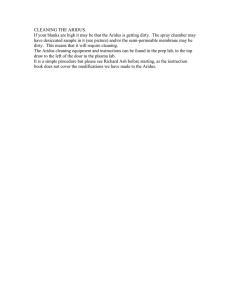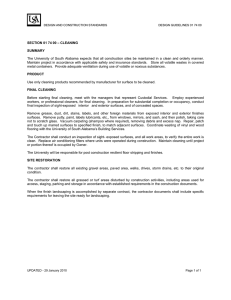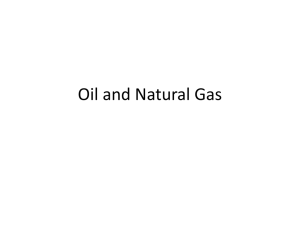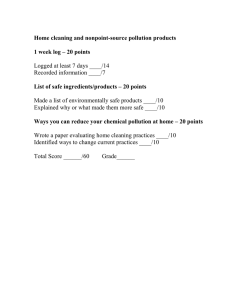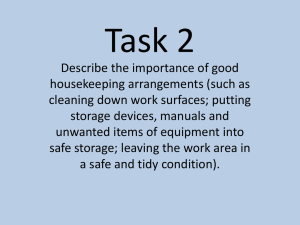Care and maintenance
advertisement
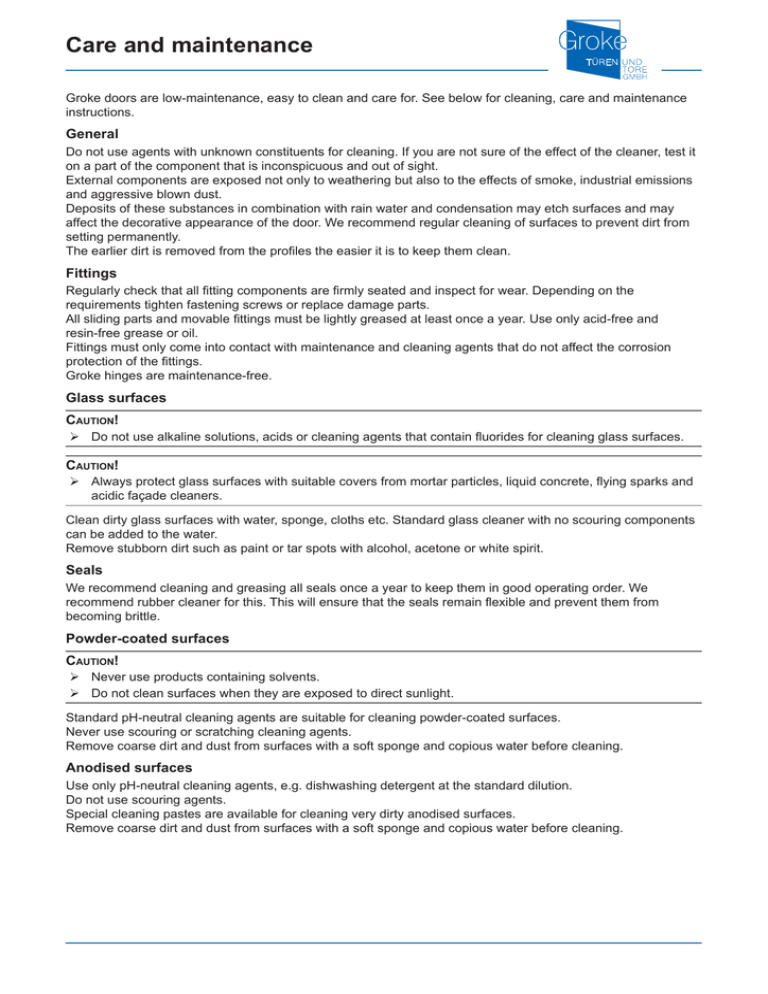
Care and maintenance Groke doors are low-maintenance, easy to clean and care for. See below for cleaning, care and maintenance instructions. General Do not use agents with unknown constituents for cleaning. If you are not sure of the effect of the cleaner, test it on a part of the component that is inconspicuous and out of sight. External components are exposed not only to weathering but also to the effects of smoke, industrial emissions and aggressive blown dust. Deposits of these substances in combination with rain water and condensation may etch surfaces and may affect the decorative appearance of the door. We recommend regular cleaning of surfaces to prevent dirt from setting permanently. The earlier dirt is removed from the profiles the easier it is to keep them clean. Fittings Regularly check that all fitting components are firmly seated and inspect for wear. Depending on the requirements tighten fastening screws or replace damage parts. All sliding parts and movable fittings must be lightly greased at least once a year. Use only acid-free and resin-free grease or oil. Fittings must only come into contact with maintenance and cleaning agents that do not affect the corrosion protection of the fittings. Groke hinges are maintenance-free. Glass surfaces CAUTION! Do not use alkaline solutions, acids or cleaning agents that contain fluorides for cleaning glass surfaces. CAUTION! Always protect glass surfaces with suitable covers from mortar particles, liquid concrete, flying sparks and acidic façade cleaners. Clean dirty glass surfaces with water, sponge, cloths etc. Standard glass cleaner with no scouring components can be added to the water. Remove stubborn dirt such as paint or tar spots with alcohol, acetone or white spirit. Seals We recommend cleaning and greasing all seals once a year to keep them in good operating order. We recommend rubber cleaner for this. This will ensure that the seals remain flexible and prevent them from becoming brittle. Powder-coated surfaces CAUTION! Never use products containing solvents. Do not clean surfaces when they are exposed to direct sunlight. Standard pH-neutral cleaning agents are suitable for cleaning powder-coated surfaces. Never use scouring or scratching cleaning agents. Remove coarse dirt and dust from surfaces with a soft sponge and copious water before cleaning. Anodised surfaces Use only pH-neutral cleaning agents, e.g. dishwashing detergent at the standard dilution. Do not use scouring agents. Special cleaning pastes are available for cleaning very dirty anodised surfaces. Remove coarse dirt and dust from surfaces with a soft sponge and copious water before cleaning. Care and maintenance Rustproof stainless steel Rustproof stainless steel is completely corrosion-resistant and therefore does not require organic coatings or metallic coatings to improve its corrosion resistance and appearance. However, stainless-steel surfaces should still be cleaned to maintain their attractive appearance and to remove deposits that could in some circumstances affect the corrosion resistance. Use a protective cleaning agent for exterior applications to prevent damaging deposits (e.g. by rust film). When cleaning surfaces that are not exposed to rain ensure that deposits are not the result of air pollution. Cleaning in coastal and industrial areas where concentrations of chlorides and sulphur dioxide may be encountered is particularly important. When cleaning in interior applications the most important task is to prevent and remove finger marks. Finger marks are particularly visible on the popular brushed and ground surfaces when they are new. They become significantly less visible after several cleaning procedures. A detergent solution will generally remove finger marks without difficulty. Some manufacturers of cleaning agents offer specialised products in which the cleaning effect is enhanced by special constituents. These products remove finger marks completely and leave a thin film that gives the treated surfaces an even appearance. Polish surfaces with a dry cloth after application. Standard household detergents that can remove traces of lime and minor discolouration can be used for stubborn deposits. After cleaning rinse the surface with plain water. The surface can then be rinsed with demineralised water such as used for ironing and is available in supermarkets) to prevent the formation of lime deposits. Then the surface is wiped dry. Scouring powders are not suitable, because they will scratch the surface. Very oily and greasy dirt can be removed with alcohol-based cleaning agents and solvents, e.g. alcohol, isopropyl alcohol or acetone, which do not harm rustproof stainless steel. Make sure that dissolved dirt is not evenly spread over the entire surface during the cleaning process. Repeat the cleaning process with clean cloths until all traces have been removed. Specialised alkali-based and solvent-based cleaners are available for paint spots and graffiti. Do not use knives and scrapers because they will scratch the metal surface. Very neglected surfaces can also be cleaned with polishing agents, such as those used for applications such as cleaning chrome on cars. Cut-polishing paste such as is used for restoring old car paint can also be used. However, care is required. Such agents can leave grinding marks on rustproof stainless steel. CAUTION! Protect the surface of adjacent components before cleaning the stainless-steel surface. Another possibility is to use special stainless-steel cleaners containing phosphorus, such as are recommended for removing iron contamination. When using such agents first clean the complete components to prevent the formation of spots. Always follow the direction and recommendations for occupational health and safety and environmental protection when cleaning. Cleaning agents that should not be used for stainless steel, include • • • products that contain chlorides, particularly those containing hydrochloric acid, bleaching agents (if used accidentally or spilt on rustproof stainless steel rinse thoroughly with plain water), silver cleaners.

